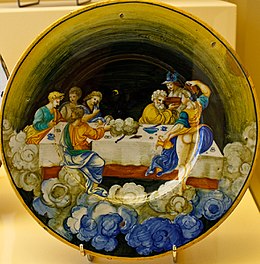
Back غذاء الخلود Arabic Ambrosia BAR Амброзия Bulgarian Ambrozi Breton Ambrosia Catalan Ambrózie a nektar Czech Ambrosia German Αμβροσία Greek Ambrozio Esperanto Ambrosía Spanish
Look up ambrosia in Wiktionary, the free dictionary.

In the ancient Greek myths, ambrosia (/æmˈbroʊziə, -ʒə/, Ancient Greek: ἀμβροσία 'immortality') is the food or drink of the Greek gods,[1] and is often depicted as conferring longevity or immortality upon whoever consumed it.[2] It was brought to the gods in Olympus by doves and served either by Hebe or by Ganymede at the heavenly feast.[3][4]
Ancient art sometimes depicted ambrosia as distributed by the nymph named Ambrosia, a nurse of Dionysus.[5]
- ^ Chisholm, Hugh, ed. (1911). . Encyclopædia Britannica. Vol. 1 (11th ed.). Cambridge University Press. p. 800.
- ^ Griffiths, Alan H. (1996), "Ambrosia", in Hornblower, Simon; Spawforth, Anthony (eds.), Oxford Classical Dictionary (3rd ed.), Oxford: Oxford University Press, ISBN 0-19-521693-8
- ^ Homer, Odyssey xii.62
- ^ Cicero. De Natura Deorum. p. 1.40.
- ^ Ruth E. Leader-Newby, Silver and Society in Late Antiquity: Functions and Meanings of Silver Plate in the Fourth to Seventh Centuries (Ashgate, 2004), p. 133; Christine Kondoleon, Domestic and Divine: Roman Mosaics in the House of Dionysos (Cornell University Press, 1995), p. 246; Katherine M. D. Dunbabin, Mosaics of the Greek and Roman World (Cambridge University Press, 1999), pp. 136, 142, 276–277.